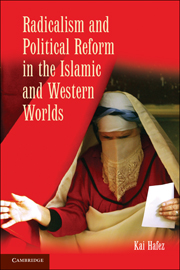Conclusion: From ‘Holy War’ to Democracy? The Current State of Islamic and Western Modernity
Published online by Cambridge University Press: 05 June 2012
Summary
Western discourse, particularly in the mass media and popular culture, but also much of academia and the high-brow cultural scene, imputes boundless radicalism, fanaticism and violence to the Islamic world. Its capacity for social and political change, meanwhile, is frequently denied. Even among the most progressive of Western thinkers, there is a long tradition of support for colonialism when it comes to Islam and the Middle East. Karl Marx himself believed that only the penetration of the religious-feudal stagnation of the Middle East by the forces of Western capitalism could lay the key foundation stones for the emergence of modernity in the region (Turner 1978). For Max Weber, Islam was the antithesis of the Protestant ethic of modernity (Salvatore 1997). We should, however, acknowledge the extenuating circumstances: while these key intellectual figures displayed an ‘Orientalist’ tendency to deny the Islamic world a capacity for development in light of its contemporary weakness, they were in the good company of the leading experts on Islam and the Middle East of the time.
This has now changed fundamentally. Since the great debate on Western scholarship on the Middle East initiated by Edward Said in 1978, the relevant academic disciplines have undergone a process of profound reform. Anyone now claiming that the Islamic world is fundamentally incapable of making cultural, social or political progress will surely be refuted by most scholars in the field.
- Type
- Chapter
- Information
- Publisher: Cambridge University PressPrint publication year: 2010



